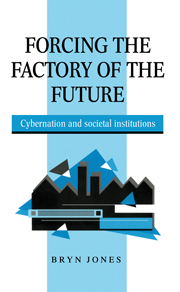Book contents
- Frontmatter
- Contents
- List of figures
- List of tables
- Acknowledgements
- List of acronyms and abbreviations
- Part I The workshop versus the factory
- Part II Technologies of control
- Part III Cybernation and flexibility
- Overview
- 6 The cybernated factory and the American dream
- 7 An American deviant: FMS at Alpha
- 8 Easy-peasy Japanesy: flexible automation in Japan
- 9 Revolution from above: FMS in Britain
- 10 The third Italy and technological dualism
- 11 Conclusion: the struggle continues
- Appendix: sources and methods
- Notes
- Bibliography
- Index
7 - An American deviant: FMS at Alpha
from Part III - Cybernation and flexibility
Published online by Cambridge University Press: 06 July 2010
- Frontmatter
- Contents
- List of figures
- List of tables
- Acknowledgements
- List of acronyms and abbreviations
- Part I The workshop versus the factory
- Part II Technologies of control
- Part III Cybernation and flexibility
- Overview
- 6 The cybernated factory and the American dream
- 7 An American deviant: FMS at Alpha
- 8 Easy-peasy Japanesy: flexible automation in Japan
- 9 Revolution from above: FMS in Britain
- 10 The third Italy and technological dualism
- 11 Conclusion: the struggle continues
- Appendix: sources and methods
- Notes
- Bibliography
- Index
Summary
In industrial case study research it pays to keep an open mind. Many different aspects of a plant – its physical appearance, the interactions amongst employees, the signs and symbols that communicate information – can all convey clues about the character of its social organisation. Intent on getting accurate answers to highly specific questions even the best researchers can tend to disregard these various sources of indirect data. However, when notice is taken of these circumstantial signs and symbols – and if the questions asked don't force the interviewees into a limited choice of alternative answers – other social realities can be reconstructed: situations diat might not have been envisaged, or are actually concealed by exclusive adherence to more formal methods.
So it was when I went to the Alpha plant. This is an old FMS; the second or third to be built in North America. Set up in 1975, Alpha was already seemingly well documented in business and research reports. Having read these reports and talked to the plant's operations manager I was mentally geared up for another bureaucratically organised FMS, like those emphasised in the preceding chapter. I was expecting it to be run to Fordist efficiency criteria, and eulogised by a junior ranking executive in business school and ‘hi-tec’ jargon. But as soon as the visit got under way my sub-conscious was bombarded with impressions that contradicted these kinds of expectation.
- Type
- Chapter
- Information
- Forcing the Factory of the FutureCybernation and Societal Institutions, pp. 151 - 164Publisher: Cambridge University PressPrint publication year: 1997



